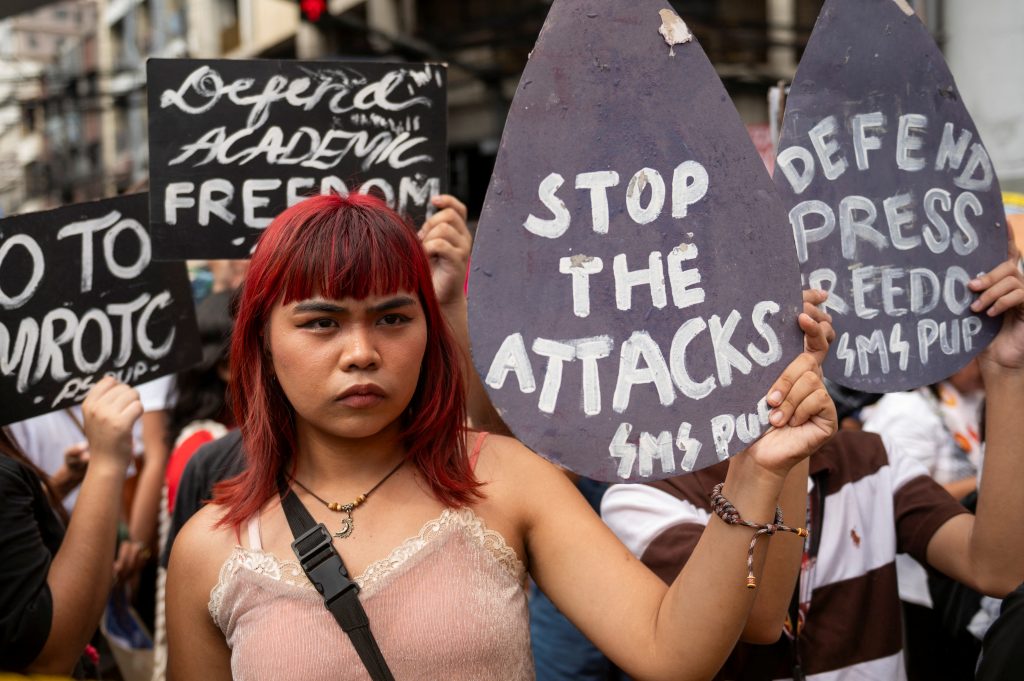In 2023 in the Philippines, the Marcos Jr regime continued its illusion of calm amid the suffering and repression of the poor. The situation on the ground reeks of privilege for the rich and powerful while the toiling masses struggle to survive.
The year started and ended with transportation problems. The first of January saw around 56,000 passengers affected by flight delays and diversions due to a power outage. The last few days of December saw commuters affected by transport strikes in the wake of the government’s modernisation program, where close to 100,000 drivers and operators in Metro Manila alone may lose their jobs.
But those in power were largely unaffected. President Ferdinand Marcos Jr went abroad 12 times this year, visiting countries like China, the United States and Japan. His travel to Beijing, the first trip for 2023, was from 3 to 5 January — two days after the air traffic issue. Even though the government claimed that his trips abroad resulted in trillions of Philippine pesos in investment pledges, critics stress that such promises are mere gestures which may or may not eventuate. They emphasise that he should instead stay in the Philippines to address serious problems like high prices and low wages.
Marcos Jr is expected to travel abroad more often in 2024 as his travel budget increased from 671 million pesos (US$12.08 million) to 1.15 billion pesos (US$20.69 million). The Philippines Congress granted this 71 per cent increase even though he overspent his 2022 foreign travel budget of 314 million pesos (US$5.64 million) by 84 million pesos (US$1.51 million). The President’s billion-peso travel expenses are part of the government’s 5.768 trillion pesos(US$103.78 billion) national budget.
But Congress has not been so kind to other politicians. Vice President and Education Secretary Sara Duterte, daughter of former president Rodrigo Duterte, had to drop her request for confidential funds amounting to 650 million pesos (US$11.69 million) due to public outcry for two reasons. The first was the impropriety of funding intelligence and surveillance operations in the basic education sector, and the second was her branding of those who oppose such funds as ‘enemies of the state’.
Congress then decided to reallocate the confidential funds allocated to the Office of the Vice President and the Department of Education, along with those of other agencies, for other purposes — like the improvement of school facilities.
In response, Rodrigo Duterte criticised the House of Representatives for removing his daughter’s confidential funds on his program on the Sonshine Media Network International (SMNI). He claimed that House Speaker Martin Romualdez was conspiring with communists and threatened to kill oppositionist ACT Teachers Party-list Representative France Castro for allegedly having communist links. This prompted Castro to file a criminal complaint against him.
It is unsurprising that SMNI allowed Duterte’s on-air tirades. SMNI hosts Lorraine Badoy and Jeffrey Celiz also engaged in red-tagging — the act of accusing individuals of being communist sympathisers or enemies of the state and targeting them for abuse — and airing incorrect information to discredit their perceived enemies, including journalists and media groups. During a congressional hearing, Celiz had to retract an on air-statement that Romualdez spent 1.8 billion pesos (US$32.38 million) on his foreign travels. Celiz, together with Badoy, was cited for contempt and detained for about one week for refusing to reveal the source of his false information and for disrespectful behaviour.
The House of Representatives is now moving to revoke SMNI’s broadcast franchise for spreading disinformation and other violations, which could mean its possible shutdown. The National Telecommunications Commission also issued a 30-day suspension against SMNI for alleged franchise violations, which SMNI later appealed. Upon being released, Badoy and Celiz said that their press freedom was abridged — a claim supported by Vice President Duterte.
But journalists and media watchdogs have denounced SMNI for invoking press freedom to justify their unethical journalism practices. Badoy and Celiz opted to red-tag those who refuse to stand by SMNI, putting at risk the safety and security of those accused of being communists.
Though SMNI’s claims are questionable, attacks on the media have certainly increased in frequency with at least three journalists being killed since Marcos Jr assumed office. The 113 incidents of media attacks under the Marcos Jr administration should be analysed in the context of the state of human rights in the country. From July 2022 to November 2023, there were 87 extra-judicial killings, 316 illegal or arbitrary arrests, 12 enforced disappearances and 22,391 bombings, among other forms of human rights violations.
Like previous years, 2023 saw not only village and youth council elections, but also many rallies. Various groups and individuals took to the streets to express their stance on pressing concerns like human rights violations, historical denialism, education budget cuts, genuine agrarian reform, wage increases, national sovereignty and jeepney modernisation, among other issues.
As these difficulties continue to prevail in 2024, the culture of resistance should persist to prevent the mistreatment of Filipino citizens.
Danilo Araña Arao is Associate Professor at the Department of Journalism, the University of the Philippines Diliman, Special Lecturer at the Department of Journalism, the Polytechnic University of the Philippines Santa Mesa, Associate Editor at Bulatlat Multimedia and Editor at Media Asia.
This article is part of an EAF special feature series on 2023 in review and the year ahead.


In 2023, the Philippines faced serious transportation issues and political controversies. President Ferdinand Marcos Jr was criticised for his frequent foreign travels and inflated travel budget for 2024, despite significant overspending in 2022. Disputes around allocation of confidential government funds, increased attacks on media groups, red-tagging and widespread human rights violations instigated protests and concerns about press freedom in the Philippines.